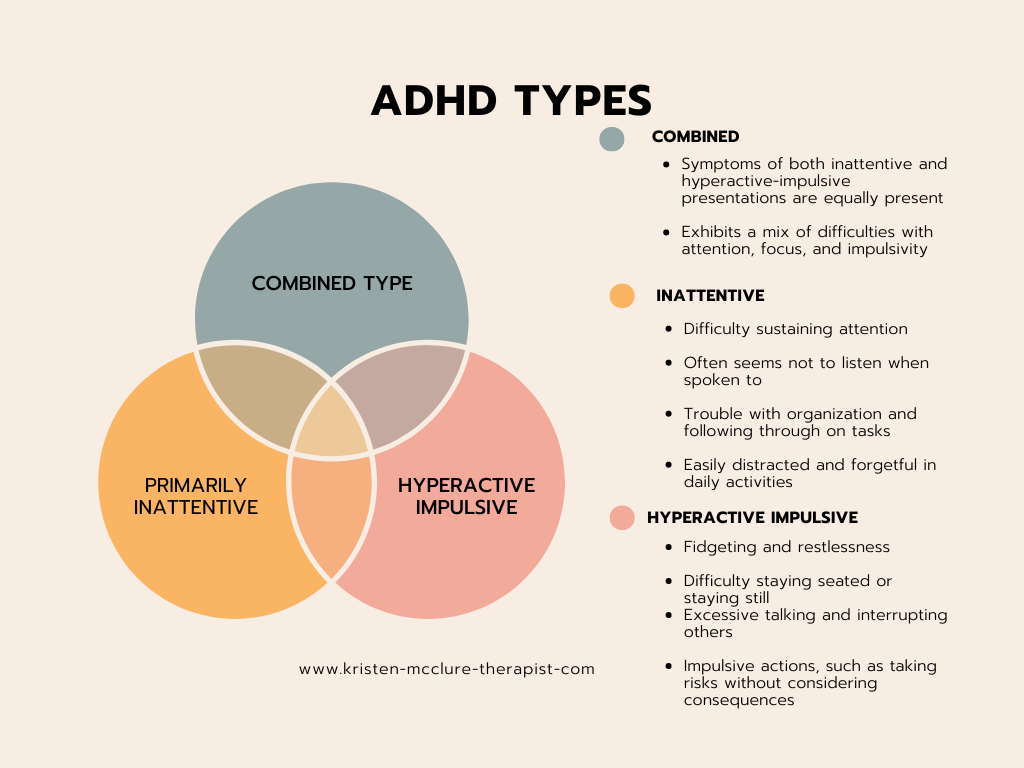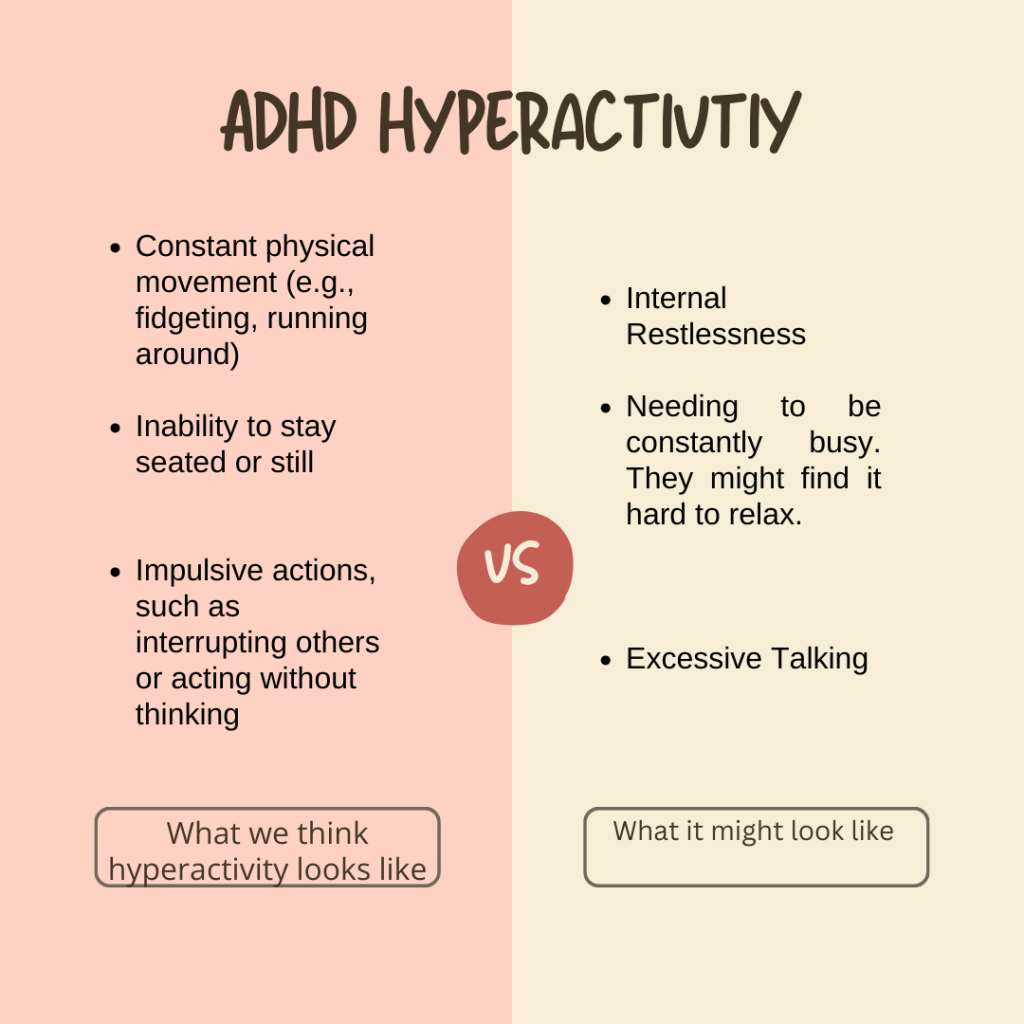🔍💡 Understanding ADHD: Diagnosis, Treatment, and Key Considerations for Women

ADHD: More Than Just Attention and Hyperactivity
From Misunderstood Behavior to Recognized Neurodivergence: Understanding the True Nature of ADHD
What Causes ADHD?
ADHD Subtypes

Attention Deficit Hyperactivity Disorder is categorized into three primary types.
- The first type is Predominantly Inattentive Presentation. Girls and women are often diagnosed with inattentive ADHD. Inattentive ADHDers often struggle with maintaining attention, following detailed instructions, and organizing tasks. They might seem to listen but don't follow through on instructions. They usually get distracted easily.
2. The second type is Predominantly Hyperactive-Impulsive Presentation. These type of ADHDers may engage in excessive fidgeting and talking. They may have impulsive actions like interrupting others or taking risks. They don't seem to consider the consequences.
3. Combined Presentation ADHD involves a mix of both inattentive and hyperactive-impulsive symptoms. Treatment and medication strategies are tailored to each subtype.
Leading expert Russel Barkley disputes these types of presentations. To learn more, click here.
Beyond Hyperactivity: Understanding ADHD as a Regulation Disorder

Hyperactivity in ADHD is often misunderstood, especially when it comes to girls and women.
In females, hyperactivity can manifest in less obvious ways:
-
Internal Restlessness
Women and girls frequently describe a constant need to stay busy, finding it difficult to relax or unwind.
-
Excessive Talking
Hyperactivity in girls and women may express itself through excessive talking, with a rapid flow of words as an outlet for their restless energy.
-
Racing Minds
Many women report that their minds are perpetually "on," making it challenging to shut down thoughts and find mental calm.
It's important to note that these manifestations of hyperactivity can be easily overlooked, especially in those who might otherwise be considered inattentive, leading to missing this sign of hyperactivity in girls and women.
Executive Functioning Challenges
The Impact on Daily Functioning
ADHD significantly affects executive functioning, which includes skills like planning, motivation, remembering, and following through on tasks. Parents and teachers might mistakenly see children who struggle with these areas as defiant or disobedient.
This misunderstanding can leave children feeling confused and bad about themselves.
Misunderstandings in Adult Relationships
Adults with ADHD face similar misunderstandings in their relationships. They might forget to do things or fail to follow through, leading others to think they are lazy or don’t care. This can create stress at work, home, and social situations. These experiences often impact self-esteem, causing shame and confusion. This is particularly challenging for women, who are usually expected to use their executive functioning skills to juggle multiple roles effectively.
Emotional Regulation Difficulties
The Challenges of Emotional Regulation
Emotional regulation involves understanding your emotions and expressing them appropriately in different situations. However, if you struggle with emotional regulation, you might get easily overwhelmed, leading to difficulties in relationships and managing stress. As a result, this can affect your performance in school, social settings, and work. Furthermore, focusing and making decisions can be challenging when emotions feel overwhelming. Despite this, emotional regulation difficulties are often overlooked because they aren't part of the core ADHD criteria.
Overlooked and Misdiagnosed in Girls
As a result, girls with ADHD are often overlooked or misdiagnosed. They may begin to hide their emotions, believing they are too much. Some might turn to substances or masking behaviors as a way to cope with their overwhelming feelings.
Best Practices for Understanding ADHD Treatment
-
🔆 Issues from trauma and grief from a late diagnosis
-
🔆 Addressing burnout
-
🔆 Affirming your nervous system's needs
-
🔆 Emphasizing self-compassion
-
🔆 Accommodating and learning about sensory differences
-
🔆 Prioritizing self-care to manage stress and prevent burnout
-
🔆 Learning self-advocacy skills, such as setting boundaries and communicating needs
-
🔆 Learning to self-accommodate
-
🔆 Managing energy and attention cycles
-
🔆 Understanding rejection sensitivity and learn how to feel safer
-
🔆 Supporting emotional regulation
-
🔆 Seeking assessment for other mental health issues like anxiety or depression
-
🔆 Finding support for alexithymia and interoception issues
-
🔆 Unmasking and reconnecting with your body
-
🔆 Developing practices to reduce anxiety and stress
-
🔆 Building a supportive network of peers and professionals
-
🔆 Exploring and embracing your unique strengths and interests
-
🔆 Supporting your executive functioning
-
🔆 Learning self-compassion to work on shame and self-criticism
-
🔆 Understanding and managing sensory overload
-
🔆 Setting realistic goals and celebrating small victories
-
🔆 Seeking education and resources on affirming neurodiversity to understand yourself better
-
🔆 Advocating for appropriate accommodations in work or school settings
-
🔆 Practicing positive interventions to support a happy brain
- 🔆 Support for physical issues from chronic stress, such as chronic fatigue, fibromyalgia and migraines
Wrapping It Up: Understanding ADHD
Beyond Recognizing Symptoms
Understanding ADHD in women goes beyond just recognizing the symptoms. The diagnosis often doesn't fully capture how ADHD manifests differently in women.
The Complex Impact of ADHD
ADHD impacts executive functioning, emotional regulation, and sensory experiences, all of which are further complicated by hormonal changes and societal pressures.
The Need for Holistic Support
Adequate support and treatment require a holistic approach. Remember, ADHD isn't a defect or a behavioral disorder—it's a neurotype! Seek out neurodivergent-friendly care, learn self-advocacy, and build strong support networks.
Further Resources on Understanding ADHD
Sources for Understanding ADHD
Medical information obtained from this website is not intended as a substitute for professional care. If you have or suspect you have a problem, you should consult a healthcare provider.
Kristen McClure: Neurodivergent-Affirming ADHD Therapist and Coach with 30 years experience in North Carolina and South Carolina Offering virtual therapy and coaching services across North Carolina, including Ashville, Raleigh, Durham, Wilmington, Greenville, and more. Also serving major South Carolina cities such as Charleston, Columbia, Greenville, Spartanburg, Rock Hill, and more.